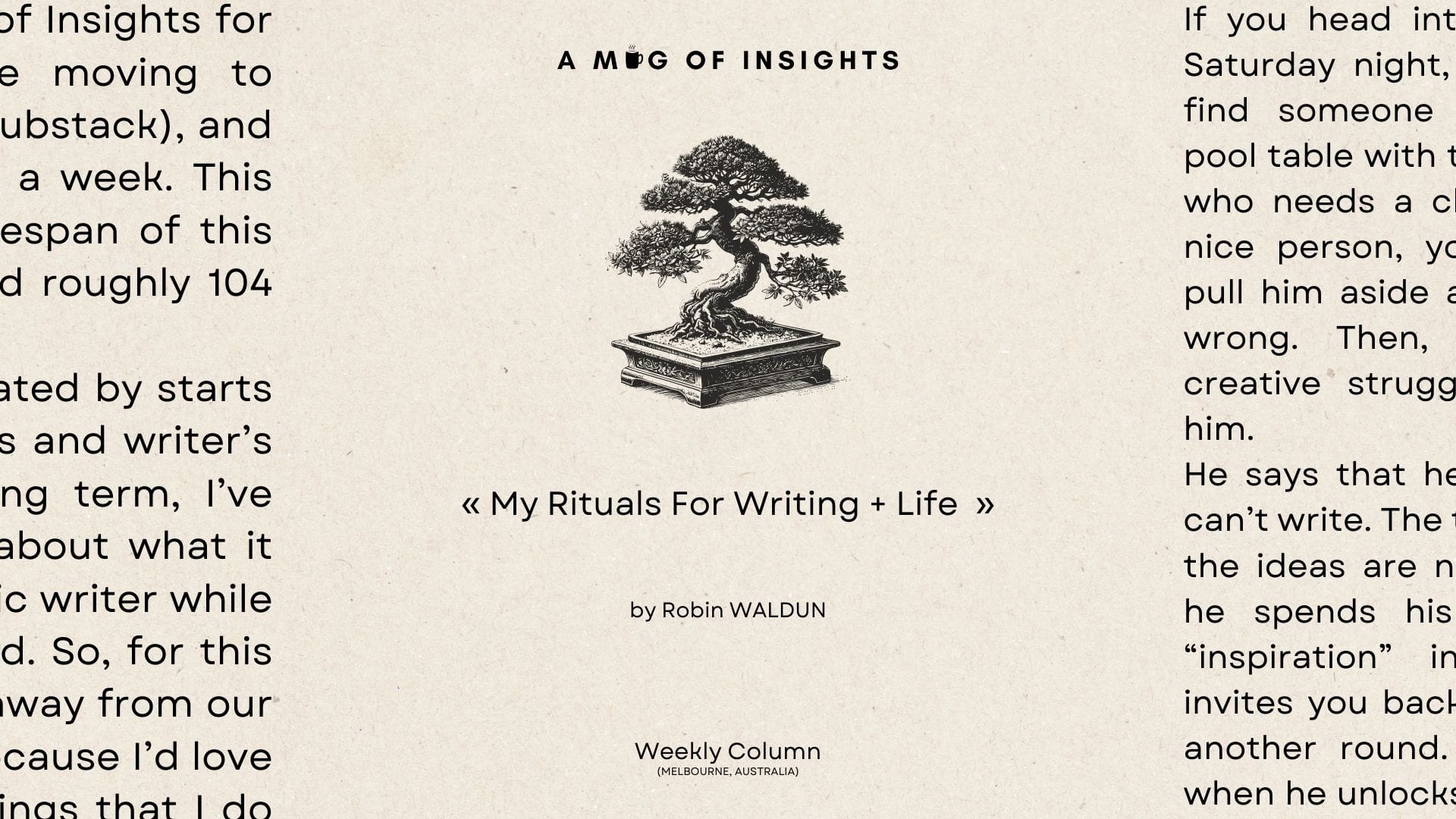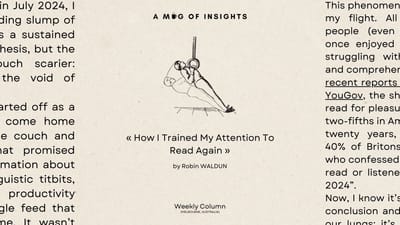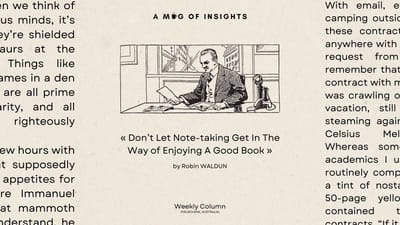My Rituals For Writing + Life

Welcome to the weekly column from A Mug of Insights' new home! From now on, I'll dispatch these letters on Saturdays, and paid subscribers will receive their 1-2-Read letters on Mondays. If you like what you're reading, consider upgrading to the Grande tier for journal prompts and a practical exercise every week to strengthen your reading muscles! Thank you for reading, and I look forward to seeing you next week.
I’ve been writing A Mug of Insights for over two years (before moving to Ghost, I was writing on Substack), and on average, I post once a week. This means that, over the lifespan of this newsletter, I've published roughly 104 essays.
The journey was punctuated by starts and stops, creative highs and writer’s blocks, but over the long term, I’ve learned a thing or two about what it takes to become a prolific writer while keeping longevity in mind. So, for this week’s letter, let’s step away from our usual song and dance because I’d love to share some of the things that I do away from my desk that transformed my creativity, allowing me to overcome a challenging period of my life while turning up every week to write, to teach and to offer value, one word at a time.
Where I was and Where I Am Now
If you head into a dive bar on a Saturday night, chances are you’ll find someone moping around a pool table with the looks of a fellow who needs a chat. Since you’re a nice person, you stop the game, pull him aside and ask him what’s wrong. Then, an avalanche of creative struggles rushes out of him.
He says that he’s a writer, but he can’t write. The timing’s never right, the ideas are never ripe, and now he spends his days looking for “inspiration” in bars. Then, he invites you back to his “studio” for another round. You say yes, and when he unlocks his front door, you start to see what’s wrong.
His laptop is on his bed. His desk is a mess as McDonald’s takeout bags are lined on his spotless kitchen floor.
Believe it or not, this person was me three years ago, and my now girlfriend had the same impression when she visited my place for the first time. I was coming out of a messy breakup with an ex, and everything in my space reeked of a recent divorcee: sterile and cold. The kitchen was spotless because I never used it. The floors were scrubbed four times a day because I couldn’t find anything better to do, and my creative space was a mess of reference books, old novels and scattered, half-finished Moleskines.
Under those conditions, it was hard to move through the day. It took enormous effort even to sit down at my desk, so getting words down on the page felt like climbing Everest. So, after a few heart-to-hearts with my close friends, I did the next best thing and checked myself into therapy.
Over the first three months of therapy, my therapist, A.C. (initials for anonymity), wasn’t too interested in my romantic jibber-jabber or creative blocks. Instead, she coached me to set up the right environment and life basics that had nothing to do with writing. “Before you can ever get to do any work that matters, you need to set up a space where you feel centred. At home and in your life.”
It took years to implement all these subtle changes, but strange things started happening. I no longer felt that dread when I crawled out of bed. Getting down to writing felt a lot easier, and the kilograms of weight on my shoulders seemed to have disappeared. I started exercising, stopped drinking and first time in a while, had so many fresh ideas that sometimes I struggle to write them all down.
And it all started with putting in some basic changes to my environment.
1: Pay attention to your environment
I’m a lifelong insomniac, so getting to sleep was synonymous with pushing myself to absolute exhaustion through partying, working myself to death or watching really boring stuff on YouTube until I tapped out. But one thing I never considered was lighting.
I had three lamps with fixed brightness, so even when it was 2 am, it still felt like the sun was hanging high in the sky. To make things worse, I liked to work with my screens turned up to full brightness without Night Shift on, so my brain was constantly high while my body screamed for rest.
One of the first prescriptions my therapist gave me was to visit K-Mart and purchase a few adjustable bulbs from Mirabella (not affiliated, so no Amazon link included; simply look it up, as they can be found at any hardware store). Within a week, these bulbs changed everything. I have them set to a biorhythm so that when 8 pm rolls around, they’ll operate at a 20% brightness and gradually decrease to 0 when it gets to 11 pm.
The difference was like night and day (no pun intended). I started to get sleepy at around 9 pm and had multiple instances of books smashing my face in while reading in bed. And gradually, I became less irritable during the day, felt less overwhelmed and could not believe that all it took was switching out the light bulbs.
2: Clean up your workspace
I noticed a paradox: for some reason, I had no issue with keeping the house clean, but my workspace was always a bloody mess. And by the time I returned to work the next day, I had to allocate 10 minutes to weave through a crap jungle.
My girlfriend passed on a few words of wisdom from TikTok. “You know, babe. Why don’t you do a closing shift every night?” It made instant sense because I’ve worked a lot of retail before starting my own business. By the time 5 pm rolled around at my old posts, I had a duster in one hand, a Dyson vacuum in the other and declared war on every dust particle in the store. But why have I never treated my own workspace the same way?
So nowadays, the ‘shut down’ button on my iMac triggers a sequence of dusting, formatting memory cards and setting my workspace up for another writing day. As a result, my desk is always clean, my camera is always ready to film, and my keyboard is always ready for my 9 am writing ritual.
3: Always work below your limit
Speaking of writing rituals, this one mindset changed everything for me.
In the West, we have an all-or-nothing approach to productivity. I either have to LOCK-IN or kick back into a 4-hour Netflix marathon. But no one has ever taught us to work below our limit to ensure longevity.
I call this trivialising writing, and it’s a powerful concept in a world where everyone tells you to romanticise everything. Let’s say I need to write a 1500-word post by Saturday. The romantic approach wants me to sit down on Friday night with a whisky in hand, bleeding in front of the keys until I vomit out those 1500 words in one go. But a trivial approach sits me down, lights an incense stick and says: if you write 300 words a day, you’ll have your 1500 words without effort by the time Friday rolls around.
This is a complete shift in how I thought about work, and now my morning writing ritual feels like a 20-minute meditation. It’s deliberate, slow, and it doesn’t swallow up a whole day. And paradoxically, I’m able to write anywhere from 8000 to 10,000 words a week using this piecemeal approach because I’ve learned to work below my limit and leave something for the next day.
And I suspect that I might’ve learned this principle from my martial arts training.
4: Lessons from Karate
When we think of knowledge work, exercise is one of the last things to come to mind. When I started writing this newsletter, exercise got pushed all the way down to the bottom of my list, and I paid for it in back pains, random mouth ulcers and chronic fatigue.
This all changed when my girlfriend started raving about this dojo that taught traditional Okinawan Gōjū-ryū karate. She said the classes were great and left her with a clear mind after training. I was intrigued, and after three trial lessons, I immediately signed up for three more months. Then my body started changing.
The seasonal mouth ulcers disappeared, and even though training took up entire evenings, it freed up so much energy during the day. I could work for longer hours without tapping out, and the chronic brain fog cleared up, allowing me to play with ideas in a clean, open field.
This brings me to the most important investment I made in my life: exercise. Nowadays, I work out 3 times a week in the gym (resistance training) and combine it with my karate nights in the dojo. These rituals that took years to build now supply me with all the energy I need to tackle a strenuous workweek.
And the thing with exercise is that there’s no one-size-fits-all solution. The only rule is to find something you enjoy and can do long-term. In Gōjū-ryū, the purpose of training is to bring balance into your form, your strikes and ultimately your life. So, it makes no sense to train like a maniac and fall into an injury that’ll stall your progress for months. The trick is to do just enough beyond your edge, then wrap it up. Just like a daily writing ritual, sometimes the best way to start exercising is to train just below your limit and leave a little bit on the table for the next day.
5: Adopt a spiritual practice
Look, I love my job more than anything else, but there were weeks when work had clouded over my life, leaving me with a deep, internal emptiness.
Most workaholics can relate to this feeling. Work promised us lasting happiness after we’ve finished that project, achieved that milestone or received that promotion. But, in my experience, the biggest career breakthroughs usually left me with the darkest voids inside.
This is one of the biggest mind-fucks when it comes down to success: it won’t bring about surplus happiness, and after a certain point, it only amplifies what’s already in us. So, the uncomfortable conclusion I’ve reached is that hard work does not exempt me from inner work.
I was diagnosed with clinical depression when I was 18, and for years I tried to resolve that feeling of inadequacy with educating myself, creating work I loved and building businesses. Over the short term, the projects kept me distracted enough to feel ok, but over any extended periods of rest, the same feeling of emptiness, dread and inadequacy rushed back, obliterating any veneer of achievement or pride. This is when I realised that I have to allocate time for spiritual work.
Now, the word spiritual is a little off-putting to a lot of people (including me). But over time, I realised that, just like exercise, it comes in so many different flavours. For some people, it’s interpreting music. For others, it’s practising calligraphy. Essentially, you have to put yourself in the presence of something larger: a deity, a traditional art or a school of epic poetry.
My poison of choice is Vipassana meditation, and I’ve been practising the same simple technique of self-observation on and off for 10 years. It started with 5 minutes a day to clear my mind, but now I’ve ramped it up to 20 minutes of sitting in silence. I won’t go into detail about my practice in this post; all I have to say is that the benefits are immense and go way beyond feeling calm and centred.
If you’re interested, I’ll dedicate an entire future post to meditation. But for now, consider adopting a ritual that allows you to zoom out of your life and get in touch with something larger than yourself. Is it reading history books? Is it picking up a musical instrument? Or is it practising Kanji calligraphy? Do it only for yourself and let go of artificial goals. This is your time to balance your inner world.
And there you have it. These are the things I do away from my desk that make what I do possible. Leave me your thoughts and comments below, and as always:
Until next week
Robin
Subscribe to my newsletter to get the latest updates and news




Member discussion